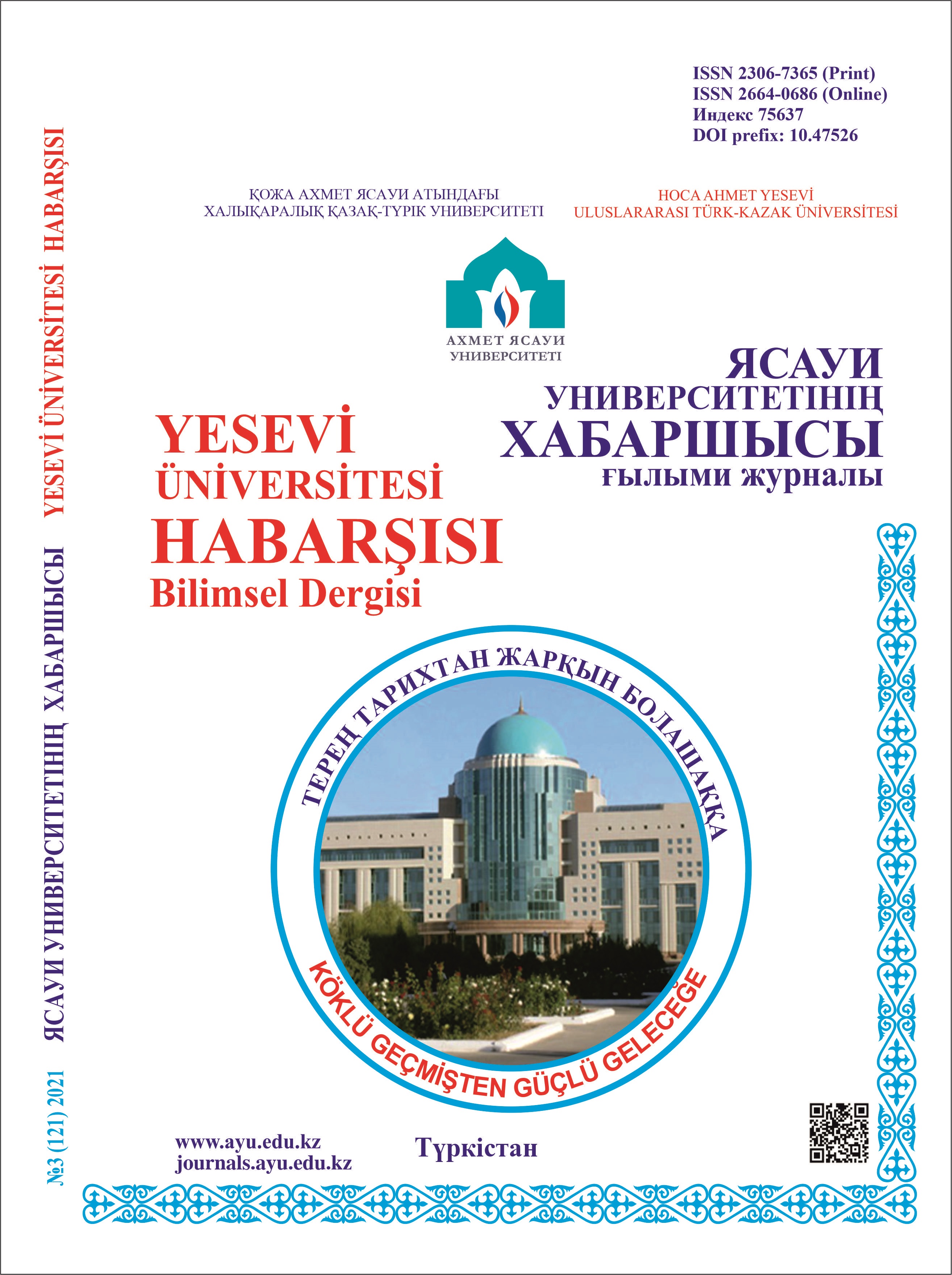Formation of Innovative STEM-education
1436 1006
Keywords:
STEM, robot, Lego WeDo constructor, HUNAROBO constructor, innovative approach, STREAM technology.Abstract
The article is devoted to the topical issue of forming a new direction of innovative STEM education. The purpose of the study is to analyze the essence and content of STEM education, identify the main problems and contradictions, and identify the main approaches to its development. To solve the tasks set, a set of theoretical methods corresponding to the subject of research and the goal was used. The theoretical and methodological basis of the study was system competencies and personal and activity approaches. A number of important problems and contradictions in the implementation of STEM education are identified, for example, the traditional education system does not fully meet the requirements and requirements of training and training of the workforce of the XXI century; difficulties in teaching subjects using the STEM method; low
level of academic performance in subjects of physical and mathematical profile, as well as lack of ability to solve specific subjects.
The article emphasizes the complexity and versatility of STEM education, as a result of which a wide variety of programs are being developed by type, direction and level of complexity to solve problems related to the lack of STEM literacy. A brief description of the main approaches to the
development of these programs was given, and the main factors of reforming education in the STEM direction were identified. All the leading countries of the world were noted.
References
ПАЙДАЛАНЫЛҒАН ӘДЕБИЕТТЕР ТІЗІМІ
Доклад всемирного экономического форума. [Электронный ресурс]. URL: http://reports.weforum.org/global-risks-2019/chapter-one/  (дата обращения 15.05.2019)
Аверин С.А., Маркова В.А. STEM-технологии в образовании: мода или реальность? // Ребенок в современном образовательном пространстве мегаполиса. Материалы IV Всероссийской научно-практической конференции / редактор-составитель А.И. Савенков. – М., 2017. – С. 193–202.
Бухинская Л.В. STEM в программе двенадцатилетнего обучения в Соединенных Штатах Америки // European research. – 2016. – №2 (13). – С. 99–101.
Репин А.О. Актуальность STEM-образования в России как приоритетного направления государственной политики // Научная идея. – 2017. – №1 (1). – С. 76–82.
Стрижак А.Е., Слипухина И.А., Полихун Н.И., Чернецкий И.С. STEM-образование: ключевые дефениции // Информационные технологии и средства обучения. – 2017. Т. 62. – №6. – С. 16–33.
Чемеков В.Н., Крылов Д.А. STEM – новый подход к инженерному образованию // Вестник Марийского государственного университета. – 2015. – №12. – С. 59–64.
Сейтвелиева С.Н. STEM-образование // Новые компьютерные технологии. – 2016. –№1 (8). – С. 96–97.
Ногайбаева Г., Жумажанова С. Развитие STEM-образования в мире и Казахстане // Образовательная страна. – 2016. – №20 (57). – С. 34–46.
Breiner J., Harkness S., Johnson C., Koehler C. What Is STEM? A Discussion About Conceptions of STEM in Education and Partnerships // School Science and Mathematics. – 2012. Volume112, Issue1. – P. 3–11. doi: 10.1111/j.1949-8594.2011.00109
Бурзалова Т.В. Учебно-исследовательская деятельность учащихся профильных математических классов как важный фактор воспитания // Вестник Брянского Государственного университета. – 2012. – №15. – С. 24–27.
Нурова Р.Ж. STEM-оқытудың жаңа әдістемесі және әлемдік білім берудің басты тренді // «IT технология және STEM оқытудың маңызы» аймақтық ғылыми-тәжірибелік конференция жинағы. – Атырау, 2021. – Б. 20–21.
REFERENCES
Doklad vsemirnogo ekonomicheskogo foruma [Report of the World Economic Forum]. [Elektronnyш resurs]. URL: http://reports.weforum.org/global-risks-2019/chapter-one/  (data obrasheniia 15.05.2019) [in Russian]
Averin S.A., Markova V.A. STEM-tehnologii v obrazovanii: moda ili realnost'? [Stem-technologies in education: fashion or reality] // Rebenok v sovremennom obrazovatelnom prostranstve megapolisa. Materialy IV Vserossiiskoi nauchno-prakticheskoi konferencii / redaktor-sostavitel A.I. Savenkov. – M., 2017. – S. 193–202. [in Russian]
Buhinskaia L.V. STEM v programme dvenadcatiletnego obucheniia v Soedinennyh Shtatah Ameriki [STEM in the twelve-year study program in the United States of America] // European research. – 2016. – №2 (13). – S. 99–101. [in Russian]
Repin A.O. Aktualnost STEM-obrazovaniia v Rossii kak prioritetnogo napravleniia gosudarstvennoj politiki [STEM education Relevance in Russia as a priority direction of state policy] // Nauchnaia ideia. – 2017. – №1 (1). – S. 76–82. [in Russian]
Strizhak A.E., Slipuhina I.A., Polihun N.I., Cherneckii I.S. STEM-obrazovanie: kliuchevye defenicii [STEM-education: key definitions] // Informacionnye tehnologii i sredstva obucheniia. – 2017. T. 62. – №6. – S. 16–33. [in Russian]
Chemekov V.N., Krylov D.A. STEM – novyi podhod k injenernomu obrazovaniiu [STEM – a new approach to engineering education] // Vestnik Mariiskogo gosudarstvennogo universiteta. – 2015. – №12. – S. 59–64. [in Russian]
Seitvelieva S.N. STEM-obrazovanie [STEM-education] // Novye kompiuternye tehnologii. – 2016. –№1 (8). – S. 96–97. [in Russian]
Nogaibaeva G., Jumajanova S. Razvitie STEM-obrazovaniia v mire i Kazahstane [Development of STEM education in the world and Kazakhstan] // Obrazovatelnaia strana. – 2016. – №20 (57). – S. 34–46. [in Russian]
Breiner J., Harkness S., Johnson C., Koehler C. What Is STEM? A Discussion About Conceptions of STEM in Education and Partnerships // School Science and Mathematics. – 2012. Volume112, Issue1. – P. 3–11. doi: 10.1111/j.1949-8594.2011.00109
Burzalova T.V. Uchebno-issledovatelskaia deiatelnost uchashihsia profilnyh matematicheskih klassov kak vajnyi faktor vospitaniia [Educational and research activity of students of specialized mathematical classes as an important factor of education] // Vestnik Brianskogo Gosudarstvennogo universiteta. – 2012. – №15. – S. 24–27. [in Russian]
Nurova R.J. STEM-oqytudyn jana adіstemesі jane alemdіk bіlіm berudіn basty trendі [New methods of STEM teaching and the main trend of World Education] // «IT tehnologiia jane STEM oqytudyn manyzy» aimaqtyq gylymi-tajіribelіk konferencija jinagy. – Atyrau, 2021. – B. 20–21. [in Kazakh]

